As a cancer surgeon in Pune, I have treated patients with a wide range of cancer types, and have performed numerous cancer surgeries over the years. In this blog, I will discuss the common types of cancer surgeries that I perform, and provide an overview of what patients can expect during and after the surgery.
- Breast cancer surgery: Breast cancer surgery is a common treatment option for women with breast cancer. The two main types of breast cancer surgery are lumpectomy and mastectomy. Lumpectomy involves removing the tumor and a small amount of surrounding tissue, while mastectomy involves removing the entire breast. Depending on the stage and type of breast cancer, the surgeon may also remove some of the lymph nodes under the arm.
- Colorectal cancer surgery: Colorectal cancer surgery is often used to remove tumors in the colon or rectum. The most common types of colorectal cancer surgery are colectomy and proctectomy. Colectomy involves removing part or all of the colon, while proctectomy involves removing the rectum. In some cases, a colostomy or ileostomy may be necessary to divert waste from the body.
- Lung cancer surgery: Lung cancer surgery is used to remove tumors in the lung. The two main types of lung cancer surgery are lobectomy and pneumonectomy. Lobectomy involves removing the affected lobe of the lung, while pneumonectomy involves removing the entire lung. Depending on the location of the tumor, the surgeon may perform a thoracotomy (a surgical incision in the chest) or a video-assisted thoracoscopic surgery (VATS) to access the lung.
- Prostate cancer surgery: Prostate cancer surgery is used to remove the prostate gland in men with prostate cancer. The most common type of prostate cancer surgery is a radical prostatectomy, which involves removing the entire prostate gland, nearby lymph nodes, and seminal vesicles. The surgeon may perform the surgery through a traditional incision or a robotic-assisted laparoscopic procedure.
- Gynecological cancer surgery: Gynecological cancer surgery is used to remove tumors in the reproductive organs of women. The most common types of gynecological cancer surgery are hysterectomy (removal of the uterus) and oophorectomy (removal of the ovaries). Depending on the stage and type of cancer, the surgeon may also remove the cervix, fallopian tubes, and nearby lymph nodes.
- Head and neck cancer surgery: Head and neck cancer surgery is used to remove tumors in the head and neck region. The most common types of head and neck cancer surgery are excisional biopsy and neck dissection. Excisional biopsy involves removing the entire tumor, while neck dissection involves removing the lymph nodes in the neck. Depending on the location and extent of the tumor, the surgeon may also remove part of the jaw, tongue, or throat.
In conclusion, cancer surgery is a complex and challenging field, and the type of surgery required will depend on the location and extent of the tumor, as well as the patient’s overall health and treatment goals. If you or a loved one is facing a cancer diagnosis, it is important to work closely with an experienced cancer surgeon who can provide individualized care and support throughout the treatment process.

